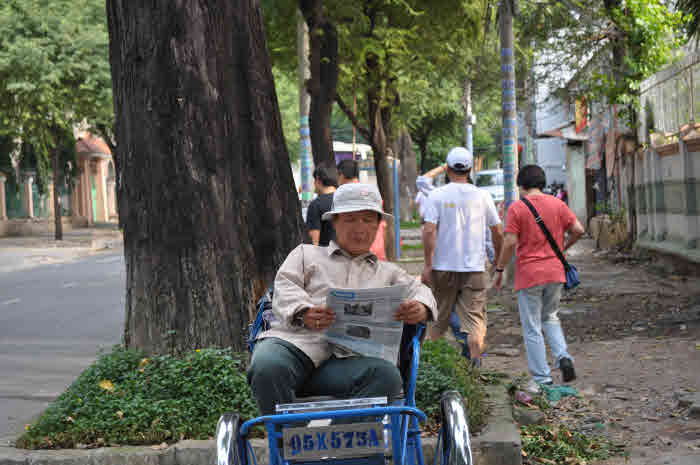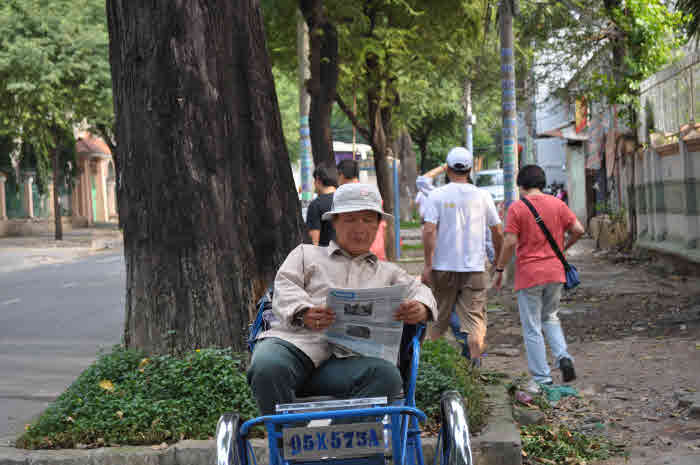Ten years back, Vietnam meant nothing to me more than the simple historic fact that it was colonized by the French and was known as one of the Indochina countries (I know, I was a geek!). Little did I think that I’d get the chance to visit the country.
The first thing I noticed in Ho Chi Minh, as we sat in the seven-seater cab taking us into the city, was how much like India this place was. Chaos reigned supreme on the roads. Platforms were studded with shady trees beneath which men and women sold all kinds of wares, most likely food. Telephone wires were caught in such an unimaginable tangle up the poles every few feet that I was sorely tempted to step out with a large pair of scissors and snip them off. Vehicles flowed by like an unstoppable river that it took one a few times of darting across holding your heart in your hand, to get used to it.
 But, unlike most of India, I realized that the people of Vietnam are calm and quiet. For all the commotion on the roads, you hardly hear an angry horn, a yell or screeching tires. People accept these trivialities and move on, hoping for better times and improved lives. They are patient, they are gracious, they smile a lot, and hardly talk (although I think this could be attributed to their not knowing English!).
But, unlike most of India, I realized that the people of Vietnam are calm and quiet. For all the commotion on the roads, you hardly hear an angry horn, a yell or screeching tires. People accept these trivialities and move on, hoping for better times and improved lives. They are patient, they are gracious, they smile a lot, and hardly talk (although I think this could be attributed to their not knowing English!).
Our first stop after we’d freshened was the War Remnants Museum, and – although any educated adult would know about this war and the atrocities around this – the museum shocked us in an unimaginable way. We walked by innumerable – and heart-wrenching – photos of people affected by Agent Orange, effects of which were visible even in their kids that were born long after the war. It makes you wonder why on earth humans could get as cruel. Coming out of the museum, I have to say I looked at these petite, smiling people differently – they’d been through a lot and had survived admirably.
The next day, we visited Cu Chi tunnels. A bit of history here – the Cu Chi tunnels were a network of underground tunnels that the Viet Cong used in the 1960s in their war against the U.S. A complex system said to wind around for nearly 250 kilometers, the tunnels are an ingenious display of architecture. They had three levels and were built especially small so as to keep out the relatively big Americans from entering them. No one is allowed unaccompanied in this area, and as our guide told us about this clever network, we couldn’t wait to try out how it would feel to crawl through them.
My friends and I crawled through the tunnels, first in amusement, laughing and giggling, and later, breathless, desperate to reach the end of the tunnel and get a whiff of fresh air and see light. At the end of it, I couldn’t help but be in awe of those soldiers who’d spent days and nights in these tunnels, eating, drinking and sleeping in those airless, dark corridors. It made me think of two things – of what the Americans had done to turn these otherwise simple Vietnamese to think of such measures, and of course, the willpower, cunning and resilience that the Vietnamese displayed, when provoked.
The next day, we decided to do something less intense – we’d seen too much of war-related happenings. And so we set off on a very typical, touristy trip to Mekong Delta, a couple of hours down south from Vietnam, during which we watched women make rice paper (literally, paper made of rice, so it’s edible), bought Vietnamese banana chips, watched women and men sell local produce on boats and waved at children in the boats. Mekong delta didn’t seem as interesting as promised, and we spent a long time on a chartered boat watching people go by their lives, that after a point it felt too intrusive, although I’m sure the people living in the boats are quite used to it by now.
We spent hours at Trung Nguyen, a famous coffee shop in Vietnam – a la Starbucks, I guess – with my friends sipping Vietnamese drip filter coffee and savouring it. The whole ambience was – what do I say, cool? that even I, who am not a coffee drinker, gave in to the experience and got a glass of mocha. Never mind the fact that I didn’t finish it; those hours we spent chatting away in the coffee shop were such an awesome memory to bring back from Vietnam. And for a nation that is still very much in the throes of development, Vietnam is surprisingly well connected online – every café has a wireless connection, adding to the joys of iPhone holders!
At the end of the Vietnam trip, I was in a way overwhelmed by the mix of emotions I’d experienced through the trip – ranging from awe at the resilience of these people, to respect for their attitude, to amusement at some of their innocent ways. And isn’t a trip that leaves you happy, satisfied, and has made you think and be thankful for what you have, successful?
[facebook]share[/facebook] [retweet]tweet[/retweet]




